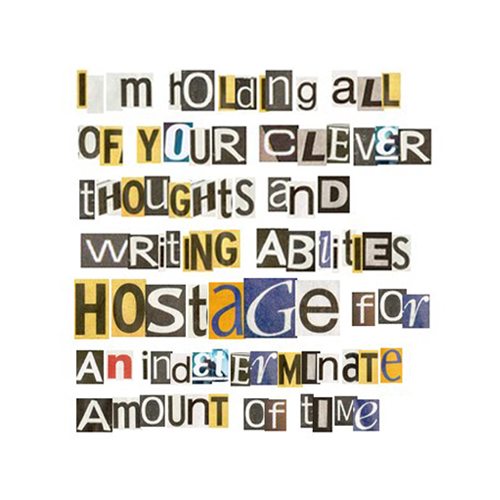Writer’s block. It’s an evil that we all face, especially those of us who are perfectionists or require oxygen and food.
Think back for a minute.
Remember when you were young and you got a writing assignment like “What did you do last summer?” And the thoughts just flowed like sweet molasses out of your brain and onto the paper? And about twenty minutes later, you turned something in on wide-ruled paper that you felt accurately conveyed your trip to the Grand Canyon or the countless hours you spent watching the Price is Right at your grandparents’ house (two possible scenarios out of many).
Fast-forward twenty years: The cursor. That blinking devilkin! Every flash represents a word that might have been … BUT WASN’T. Okay, it’s not that serious, but it can be terribly frustrating. Fear not. I come bearing tips to beat back the blank slate beast.
1. You’re not Dickens/Didion/Dostoevsky, and that’s okay.
Go ahead and release that pressure valve right now. Plus, they probably wrote a bunch of crappy stuff, too. The main difference is (okay – aside from some quantity of absurd talent), they wrote through it. They rock-tumbled that ugly nugget of a rough draft into a polished gem. It is nearly impossible for anything to come out perfectly the first time, and it’s usually the struggle that unearths your most interesting thoughts.
Whenever I look at something I’ve just written and think, “Wow, this is all terrible,” I’m reminded of some wisdom from my ukulele-playing sensei*: Crap ideas can be fertilizer. Let that idea marinate, and then let it liberate. Maybe that terrible idea is the ripe cow pie that will make your inspiration garden grow. Or maybe it’s not. But you’ll never know unless you throw that sucker down. Blank screens inspire nothing but rage.
2. Maybe you don’t know enough about what you’re writing about.
And with this I return to the elementary school writing assignment example. The reason that was so easy (aside from the fact that you probably weren’t impeding your progress with constant judgment), was that you knew exactly what you were supposed to be talking about. It was easy to find a flow because you were drawing on direct experience.
This summer was really fun. I love the Showcase Showdown. I think it’s funny that old people always win the air hockey table, and young people always win the dinette set. My grandma made cookies.
But most of the things you have to write as an adult are not delightful musings about Bob Barker. They’re reports, papers, presentations. Even the BS alchemists among us will eventually hit a wall if the raw information just isn’t there. If you find yourself spinning your wheels on a project, go back to the research stage for a while. And don’t feel bad if you need to ask for more information. It won’t just make your life easier – you’ll produce better work, too.
3. Back away from the screen.
Sometimes, just changing venues or writing methods can make a huge difference. Maybe you need to use a pen. Maybe you need to think visually instead of verbally. Maybe you need to go for a run. Basically, do whatever you need to do to shake the Etch-a-sketch of your mind clean.
4. Practice.
Not really groundbreaking, but begrudgingly true. The more you can make something into a habit, the less foreign and intimidating it will feel. Like flossing.
When in doubt, exhale and realize that the apprehension you feel is part of the creative process. Take the first step, break through the inertia, and put something down on paper (even if it’s crap).
*Ukulele-playing senseis are also helpful against writer’s block.




